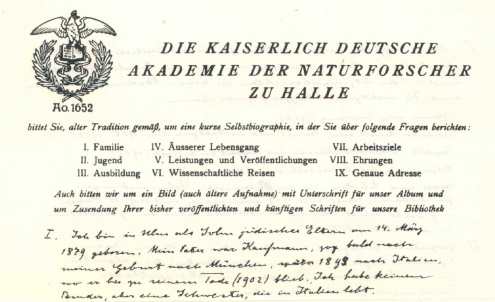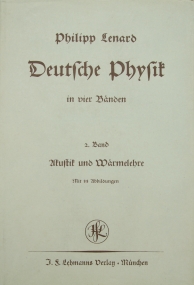“Es gereicht mir zur ganz besonderen Freude, Ihnen mitteilen zu dürfen, daß Sie in der gestrigen Sitzung der halleschen Mitglieder der Deutschen Akademie der Naturforscher, im Gedenken an den 100. Todestag von Wolfgang von Goethe, der Mitglied unserer Akademie war, zum Mitglied ernannt worden sind, im Gedenken an Ihre, eine neue Zeit auf dem Gebiete physikalischer Forschungen und Denkweise bestimmenden, grundlegenden Arbeiten. Ich bitte um Mitteilung, ob Sie die Wahl annehmen.“
Emil Abderhalden (1877-1950) an Albert Einstein, 12. März 1932
“I am very happy to be able to let you know that you have been nominated as member in the yesterday meeting of the Halle members of the German Academy of Natural Scientists, in memoriam of the 100th day of death of Wolfgang von Goethe, who was a member of our academy, in memoriam of your basic works which bring about a new time in the area of physical research and thinking. Please let me know whether you accept the nomination.“
Emil Abderhalden (1877-1950) to Albert Einstein, March 12, 1932
EINSTEIN AND THE IMPERIAL GERMAN ACADEMY OF NATURAL SCIENTISTS IN HALLE, LEOPOLDINA
A short history of the Academy
On January 1, 1652 the German Academy of Natural Scientists Leopoldina was founded as scientific-medical society in Schweinfurt. The founding members of this private society were the physicians Johann Laurentius Bausch (1605-1665), Johann Michael Fehr (1610-1688), Georg Balthasar Metzger (1623-1687) and Georg Balthasar Wohlfarth (1607-1674). First President was J. L. Bausch. The society was founded to deepen scientific knowledge as well as to improve the communication among natural scientists, especially among physicians. Starting in 1670 the Academy published the first natural scientific-medical journal of the world. In 1677 Emperor Leopold I (1640-1705) recognized the Academy officially and ten years later it was awarded the privileges of a “State Academy”. The name of the Academy can also be traced back to Leopold I. From 1687 it was allowed to call itself “Sacri Romani Imperii Academia Caesareo-Leopoldina Naturae Curiosorum”, short Leopoldina. In the course of many years the seat of the Academy changed again and again. This change of location had its reason in the statutes of the Academy. They said that the location should be the residence of the respective President. From 1878 Halle on the river Saale was the permanent seat of the Academy. The back then President was the physicist Carl Hermann Knoblauch (1820-1895). In July 2008 the Leopoldina was appointed National Academy of Sciences.
Today the Leopoldina is the oldest still existing scientific-medical research institute in the world. It “sees its most important tasks in the promotion of science, maintenance of the interdisciplinary communication and the propagation of scientific knowledge as well as in the consultancy of the society and politics in current questions of science and science policy.” This “among other things through the organization of scientific events, publication of the worked-out results, maintenance of a scientific archive and library, award of honours and prices, among other things for the promotion of young scientists.”
The members of the Academy are scientists from all over the world with a President in the lead. For natural scientists it is one of the highest honours to be elected in the German Academy of Natural Scientists, the Leopoldina. Those persons are elected by the Chair, which may expand for this purpose according to an election procedure which has to be decided by the Senate. Each person that is elected into the Academy has to provide a short autobiography with a portrait as well as a list with the scientific publications. A register file is opened for each elected member. After the election is approved of the new member of the Academy is entered into the registration book of the Academy. The respective portrait is integrated into the inventory of the comprehensive picture collection of the archive. All new members are registered as full members.
Many reputable and important scientists, among them numerous Nobel laureates, were/are members of the Academy, for example Ernst Abbé, Niels Bohr, Carl Bosch, Marie Curie, Paul Dirac, Enrico Fermi, Walther Gerlach, Johann Wolfgang von Goethe, Fritz Haber, Ernst Haeckel, Otto Hahn, Werner Heisenberg, Gustav Hertz, Alexander von Humboldt, Max von Laue, Konrad Lorenz, Lise Meitner, Robert Millikan, Fridtjof Nansen, Linus Pauling, Max Planck, Lord Ernest Rutherford, Werner von Siemens, Viktor Weisskopf and Albert Einstein.
Deutsche Akademie der Naturforscher Leopoldina (German Academy of Natural Scientists Leopoldina)
Albert Einstein and the Imperial German Academy of Natural Scientists in Halle, Leopoldina
On March 17, 1932 Albert Einstein was admitted to the Imperial German Academy of Natural Scientists in Halle. This was done on proposal of a member of the Chair of the Academy, the experimental physicist Gerhard Hoffmann (1880-1945) who justified this with Einstein‘s scientific performances, his memberships in other academies, the received honours as well as the Nobel Prize.
Already in 1926 Einstein and Max von Laue, Otto Hahn and Lise Meitner were mentioned on the proposal list for new members. The three last named persons and others were admitted, however, not Albert Einstein. In the documents which are still available today we cannot find any obvious reason for this. That he was overlooked was surely no incident. However, antisemitism alone cannot have been the reason, because in addition to Lise Meitner more scientists with a Jewish background were admitted in 1926. But maybe it was Einstein‘s public performance against militarism and chauvinism, which was not wished-for by a conservatively influenced Chair with the geologist and paleontologist Johannes Walther (1860-1937) in the lead. It is also possible that political considerations played a role because there were many opponents of Einstein‘s Theories of Relativity.
In 1932 Johannes Walther was replaced as President of the Academy by the Swiss physiologist and biochemist Emil Abderhalden (1877-1950), who reorganized the Academy from scratch. His role in the “Third Reich” is not clear. Abderhalden supported the proposal of Hoffmann to admit Einstein to the Academy. However, he was aware of the embarrassment to now beg Albert Einstein who had been rejected by the Academy in 1926 to accept his nomination. In his letter dated March 12, 1932 he wrote:
“… Es gereicht mir zur ganz besonderen Freude, Ihnen mitteilen zu dürfen, daß Sie in der gestrigen Sitzung der halleschen Mitglieder der Deutschen Akademie der Naturforscher, im Gedenken an den 100. Todestag von Wolfgang von Goethe, der Mitglied unserer Akademie war, zum Mitglied ernannt worden sind, im Gedenken an Ihre, eine neue Zeit auf dem Gebiete physikalischer Forschungen und Denkweise bestimmenden, grundlegenden Arbeiten. Ich bitte um Mitteilung, ob Sie die Wahl annehmen.“
Translation:
“… I am very happy to be able to let you know that you have been nominated as member in the yesterday meeting of the Halle members of the German Academy of Natural Scientists, in memoriam of the 100th day of death of Wolfgang von Goethe, who was a member of our academy, in memoriam of your basic works which bring about a new time in the area of physical research and thinking. Please let me know whether you accept the nomination.“

on the occasion of his admission to Academy, 1932
Leopoldina – Archive, Inventory M 1 registration, 3879
Download:
After Einstein had accepted the nomination (unfortunately the written acceptance of Einstein is lost) he was asked by Abderhalden to provide an autobiography and a portrait, as this was usual when entering the Academy. Einstein did this willingly. The autobiography and the answer to the questions were handwritten by him. Einstein was given the registration number 3879.
Einstein‘s registration file is probably lost, however, the questionnaire which Einstein filled in by hand with data concerning his curriculum vitae and his scientific work can today be found in the archive of the Leopoldina.
Einstein‘s membership in the Imperial German Academy of Natural Scientists in Halle, Leopoldina, should not last long.
Albert Einstein who had been a full member of the Berlin Academy since 1914 and corresponding member of the Bavarian Academy since 1927 had publicly expressed his opinion concerning the political development in Germany at the time of the takeover and had left the Berlin Academy. When the Chair of the Bavarian Academy subsequently asked him for a personal explanation Einstein responded on April 21, 1933 from the Belgian holiday resort Le Coq-sur-Mer, that the reasons for his retirement from the Prussian Academy would not “in and of itself” require a disengagement of his relationships to the Bavarian Academy. However, he wished to be cancelled from the members‘ list. In the letter to the Bavarian Academy of Sciences Einstein writes:
“… Wenn ich trotzdem wünsche, daß mein Name aus der Liste der Mitglieder gestrichen wird, so hat dies einen anderen Grund: Akademien haben in erster Linie die Aufgabe, das wissenschaftliche Leben eines Landes zu fördern und zu schützen. Die deutschen gelehrten Gesellschaften haben aber – soviel mir bekannt ist – es schweigend hingenommen, daß ein nicht unerheblicher Teil der deutschen Gelehrten und Studenten sowie der auf Grund einer akademischen Ausbildung Berufstätigen ihrer Arbeitsmöglichkeit und ihres Lebensunterhaltes in Deutschland beraubt wird. Einer Gesellschaft, die – wenn auch unter äußerem Druck – eine solche Haltung einnimmt, möchte ich nicht angehören.”
Translation:
“… If I nevertheless wish to have my name cancelled from the members‘ list, this has another reason: Academies first of all have the task to promote and to protect the scientific life of a country. However, the German scientific societies have – as far as I know – accepted without saying, that an important part of the German scientists and students as well as the people who are working due to an academic education are deprived of their possibilities to work and to earn their living in Germany. I do not want to be a member of a society which – however, under pressure from the outside – takes such a stance.”

“Deutsche Physik”, Philipp Lenard
Also the scientist society Leopoldina in Halle a. d. Saale had excluded Einstein already in the beginning of the year 1933. However, they had not told Einstein! Why Einstein was cancelled from the members‘ list remains a mystery. The public presence of Einstein, his Jewish background as well as the influence of the opponents of Einstein‘s theories of relativity, the representatives of the “German Physics”, may have been reasons for the cancellation. In the registration book only the handwritten pencil entry “cancelled” can be found under the registration number 3879. In the members’ list of 1933 Einstein‘s name cannot be found. We do not know who told Einstein about the cancellation from the members‘ list of the Leopoldina; maybe it was his friend Max von Laue. However, the brochures of the Academy were still sent to Einstein. When the Academy tried to contact Einstein again after the end of World War II he was already living and working in the USA and ‘did not want to have anything to do with Germans, also not with a relatively harmless Academy’.
In March 1954 Einstein received a congratulation letter from the Leopoldina on the occasion of his 75th birthday which he celebrated in Princeton. He answered with a printed and signed thank-you card.
In the printed members‘ list of 1955 we find Einstein’s name again, here on the list of the deceased members. Einstein had died in Princeton on April 18, 1955.
Illustration credits:
Courtesy of the Deutschen Akademie der Naturforscher Leopoldina: 1
Archive of the author, Hans-Josef Küpper, Cologne: 2
Bibliography:
| Deutsche Akademie der Naturforscher Leopoldina | Festgabe zur Jahresversammlung 1979/80 RAUM UND ZEIT ACTA HISTORICA LEOPOLDINA, Nr. 14 | Halle/Saale 1980 |
| Karsten Jedlitschka | Das Archiv der Deutschen Akademie der Naturforscher Leopoldina ACTA HISTORICA LEOPOLDINA, Supplement 4 | Halle/Saale 2007 |
| Sybille Gerstengarbe, Benno Parthier | Albert Einstein – Akademiemitglied in der Leopoldina scientia halensis 3/2005 | 2005 |


 DEUTSCH
DEUTSCH